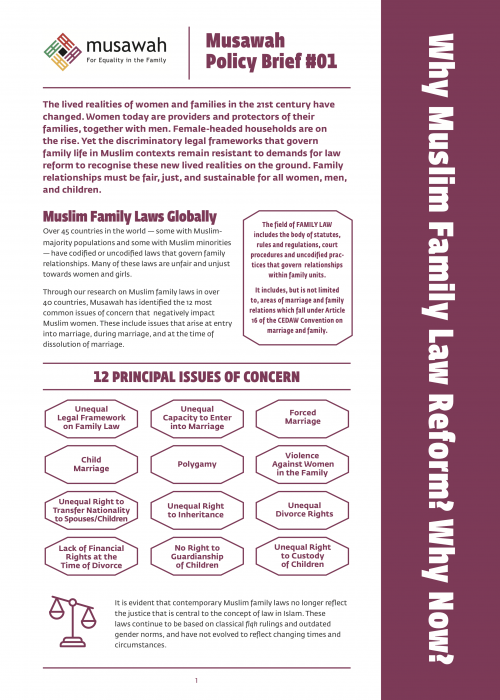‘Policy Brief 1: Why Muslim Family Law Reform? Why Now?’ outlines 10 fundamental facts to make the case for the reform of Muslim Family Laws, especially since resistance to reform is based on religious justifications.
Many contemporary Muslim family laws continue to be based on classical fiqh rulings and outdated gender norms, and they reflect neither the justice that is central to the concept of law in Islam, nor our changing times and circumstances.
Several arguments commonly used to resist family law reform in Muslim contexts are often based on religious grounds. However, over the past decades, scholarship and activism in the Muslim world have developed to make the case for the possibility and necessity of reform; this brief distills the 10 strongest arguments for reform.
Please refer to the Policy Brief 1 resource list here.
ورقة سياسات رقم 1: ” ما الذي يجعل مطلب إصلاح قوانين الأسرة ضروريًا، ولماذا الآن؟”
غالبًا ما تصطدم دعاوى إصلاح قوانين الأسرة في المجتمعات المسلمة بعدة طروح، ينبثق معظمها من منطلقات دينية. ولكننا نجد أن الجهود البحثية والنشطوية قد تطورت خلال العقود الماضية ونجحت في أن تبرهن على إمكانية الإصلاح بل وضرورته
تلخص ورقة السياسات أقوي الحُجج المؤيِّدة لتعديل قوانين الأسرة في عشرة حقائق أساسية، تبرهن على ضرورة الإصلاح التشريعي
…..
IN THIS SERIES:
‘Policy Brief 1: Why Muslim Family Law Reform? Why Now?’ is available in ENGLISH and ARABIC.
‘Policy Brief 2: Ending Child Marriage in Muslim Family Laws’ is available in ENGLISH and in ARABIC.
‘Policy Brief 3: Ending Polygamy in Muslim Marriages’ is available in ENGLISH, ARABIC, SINHALA and TAMIL
‘Policy Brief 4: Equal Divorce Rights in Muslim Family Laws’ is available in ENGLISH and ARABIC.
‘Policy Brief 5: Fair and Just Financial Rights Upon Divorce’ is available in ENGLISH and ARABIC.
‘Policy Brief 6: Upholding the Best Interests of the Child in Custody and Guardianship’ is available in ENGLISH and ARABIC.
‘Policy Brief 7: Marriage as a Partnership of Equals’ is available in ENGLISH and ARABIC.

